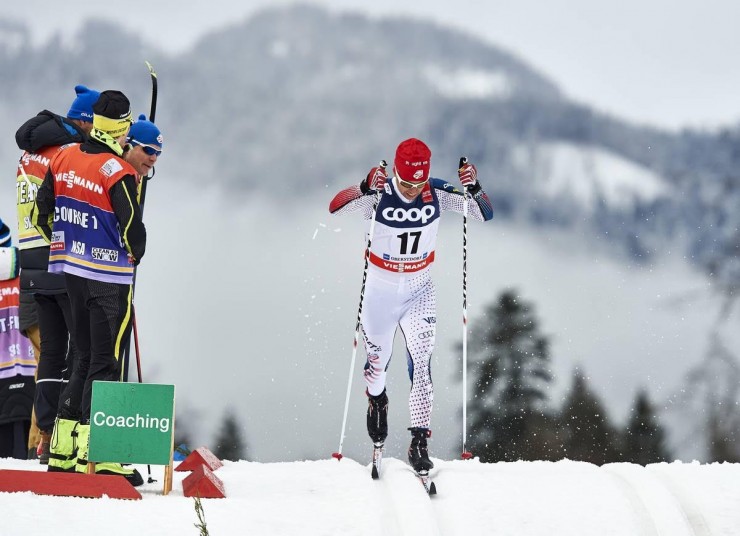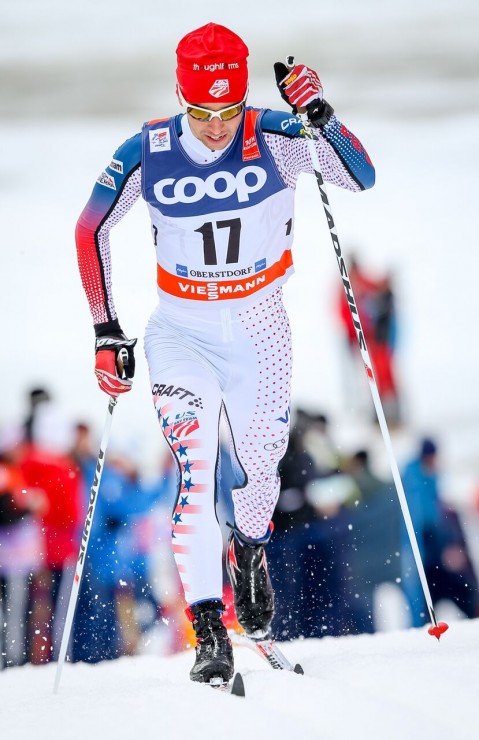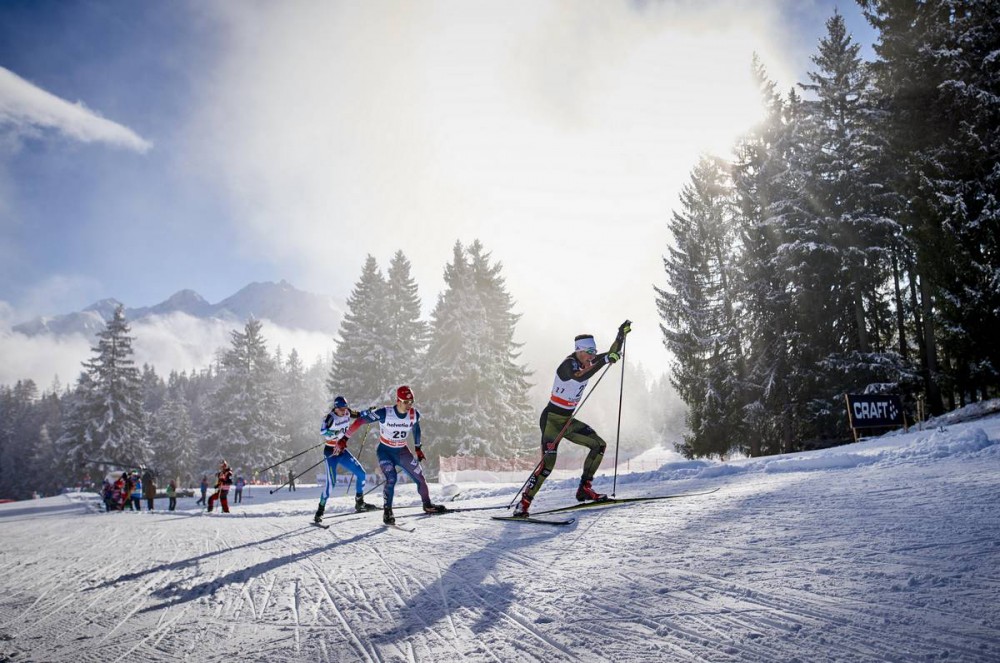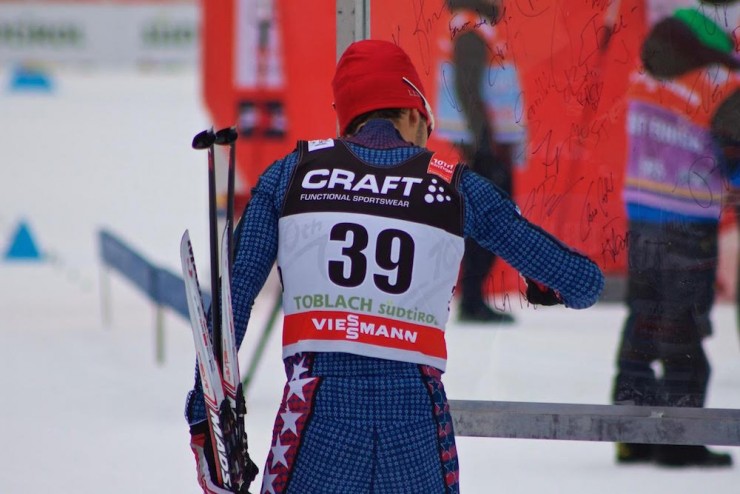
Let’s start with the latest. Noah Hoffman skied to 23rd place in Saturday’s seventh stage of the Tour de Ski, a 15-kilometer classic mass start in Val di Fiemme, Italy. Hoffman finished 1:37.1 behind race winner Martin Johnsrud Sundby of Norway. Sundby continued to lead the Tour heading into Sunday’s eighth-and-final stage, a 9 k freestyle hill climb up Alpe Cermis.
Of the seven stages down from this edition of the Tour de Ski, Hoffman has set some personal-best benchmarks. Reading across the spreadsheet of the men’s overall standings, Hoffman has placed in the top 30 — that’s within the World Cup points — in three of the four Tour distance stages thus far.
He placed 23rd in Stage 2, the 30 k classic mass start classic in Lenzerheide, Switzerland. He notched 19th in Stage 6, a 10 k freestyle individual start in Toblach, Italy. And now, on Saturday, he was again 23rd. Hoffman’s only sour distance race of the Tour: 41st in Oberstdorf, Germany. That 15 k classic mass start also saw fixtures like Sundby and Krogh fall out of the race’s top 20.

Before we jump into Hoffman’s reflection on the Tour, it’s a good idea to jump back to the beginning.
According to the International Ski Federation (FIS) database, Hoffman, 26, had been competing on the World Cup since 2009. His results over the years have been a smattering of far-off-the-pace results to top-30 near misses, to days like this one in 2013: the final day of the Ruka Triple, when Hoffman skied to ninth overall with the fastest time on the day.
If anything, this year’s Tour shows promise. It will be the first time Hoffman has completed an eight-stage tour, an achievement in itself. (He missed most of last season after suffering a broken leg on the World Cup’s opening weekend).
“I’m in new territory now – this is the longest tour I’ve ever done, previously it has been seven stages, and I just finished the seventh stage today,” Hoffman said on the phone after Saturday’s race. “You know, one more to go in this tour. Honestly the longer the Tour goes the better I think it is for me, because I kind of thrive on limited recovery and that type of thing.”
In a self-deprecating manner, maybe with an eye towards the sensational results of the U.S. women’s team, Hoffman said his results keep him motivated.
“Obviously I haven’t been spectacular – I’ve been consistently in the points, which is nice – it’s where I want to be, except for the 15 k in Oberstdorf,” he said. “But I’m tired. I say that because everyone’s tired and I am tired, but I actually feel quite good and I’m optimistic. I’m looking forward to tomorrow.”
Sunday’s race, the climb up Alpe Cermis, will require Hoffman to have a solid race effort to move up in the standings. “Race efforts,” is something Hoffman brought up to describe why he has struggled breaking into the elite distance-skiing ranks on the World Cup.
“Honestly I think the biggest struggle in my career is building good race efforts,” he said. “I truly believe that on any given day, I can be one of the top-10 athletes in the world on fitness. I’ve worked hard to develop my strength and technique, but building good race efforts has been a real struggle for me.

“What tours give me is day after day of practice,” he continued. “If you screw it up one day, you’ve got another opportunity the very next day. For someone like me, where the limiting factor really is putting together great races, that’s a golden opportunity. And this is just the first of two eight-day tours this year [with the Ski Tour Canada ending the World Cup season in March]. It’s a really really good opportunity. The more racing the better from my perspective because of those opportunities to build good race efforts and to learn and to improve on my ability to execute.”
Race effort can mean different things to different skiers. Hoffman clarified what, for him, is a well-executed race effort.
“The biggest thing for me is basically staying relaxed, what I call it is keeping my skiing ‘clean,’ ” he explained. “Clean of tension. I’ve had some very poor efforts at doing that this year – those are going to be my bad race results. Davos, I went out way too hard in that 30 k, was not skiing clean, and I just blew up [he placed 52nd in the 30 k freestyle].
“The 15 k in Oberstdorf a couple days ago, I really struggled to keep it clean,” Hoffman added. “I used my aerobic capacity, and that’s my goal every single race, to use my full aerobic capacity because when I do that I’m going to be in there and be competitive. All that being said, in a mass start setting, you’ve got to keep the pace of the group. There’s such an advantage to skiing behind people because of physical draft and faster track, but also just in terms of being able to pace off of them and relax because you don’t need to be pushing as much.
“Yesterday in the skate race I did a really good job of skiing clean and relaxed. It was a very conservative feeling effort – it didn’t take a lot out of me, I didn’t max my heart rate super high, and yet it was just clean skiing, energy based skiing, and it turned into a top-20 result,” he continued. “That’s the kind of fitness I have, if I can just make use of it. I struggle a little bit to do that same thing in classic, but the goal was to reproduce that effort and keep it relaxed and clean as much as possible in the group, and I did a fairly good job of that today. I don’t know that I have the execution fault today – it’s more like that’s where I am right now in classic, and that’s fine.”
Hoffman is perhaps the most analyzed cross-country skier currently on the U.S. Ski Team. One of his coaches, Zach Caldwell, posts a few videos annually of Hoffman working on technique, using “cues” to build power and efficiency. Hoffman also posts to his personal blog almost daily.
“I know people when they watch me ski, they feel like I have too high of a tempo and I don’t ski with enough power and I don’t glide enough,” Hoffman said. “And those are all fair criticisms, and to be at the top of the sport I do need to learn how to ski with more power efficiently and cleanly, but to get a representative effort out of myself all I need to do is ski to my aerobic capacity and tempo based skiing, with relaxed muscles.”

Saturday’s effort placed him 23rd in the Tour, against the best skiers in the world.
“I think it was a representative effort, which is always the goal,” he said. “It’s not even close to best in the world, 2 minutes down in a 15 k is not gonna do it for any great, ground-breaking result, like Jessie yesterday or Sophie two days ago. But it’s a place that I believe I can reproduce over and over again this season, and that I can build from when I have the day where everything clicks where I am able to push past that line of just skiing conservatively if you will. Then a 23rd-place finish is a place to build from.”
The Tour’s conclusion is both a physical spectacle for the racers and a viewing spectacle for hillside fans and at-home TV viewers around the globe. At the end of the day, performance is reduced to time. And for all but a single athlete — the winner — that time will be described as “time back.” If you’re scared of being exposed, this perhaps, is not a sport to embrace.
Hoffman is up for the challenge.
“Tomorrow sets up really well for me. In the the two times I’ve done this hill climb I have not had a representative effort,” he said. “But I believe that I can be one of the best in the world on that course. You couldn’t design something that could be more to my strengths. I’ll be starting in a wave which is a great place to start for a good time, because it means that I’ll have really fast skiers to ski down the valley with to the base of the climb. And I’ll have some of the best climbers in the world in that group – [Canada’s Ivan] Babikov, who won this stage previously … there’s guys in that group that are gonna be skiing fast tomorrow, and I really believe that I can ski with them, and I look forward to the opportunity.”
Hoffman heads into the Tour’s final stage in 26th place and will start 9:48 behind overall leader Sundby.
Saturday’s results | Tour standings (through Stage 7) | Sunday’s start list
Jason Albert
Jason lives in Bend, Ore., and can often be seen chasing his two boys around town. He’s a self-proclaimed audio geek. That all started back in the early 1990s when he convinced a naive public radio editor he should report a story from Alaska’s, Ruth Gorge. Now, Jason’s common companion is his field-recording gear.



